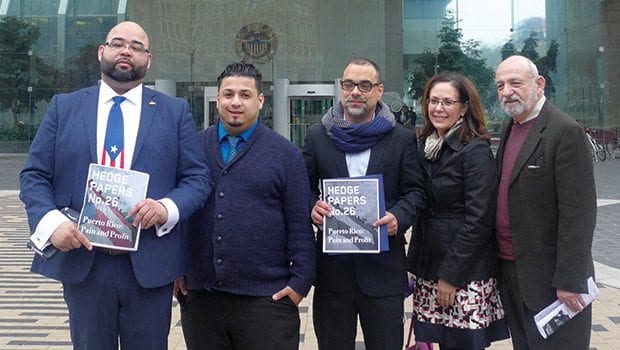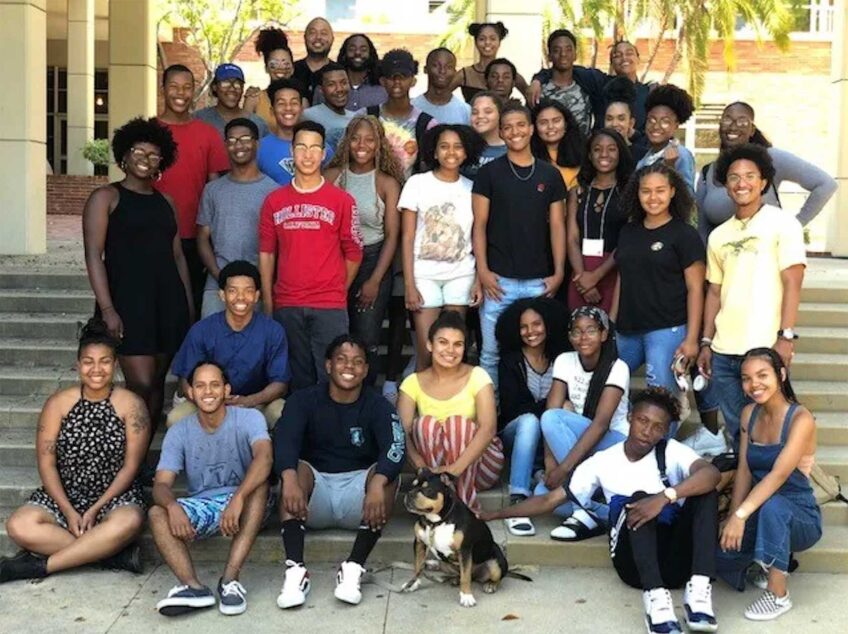
Alliance for Puerto Rico Massachusetts, an organization of Puerto Rican labor and community leaders, mobilized a handful of supporters to appear at the Federal Reserve Bank of Boston last week and deliver a report to the bank’s president along with a request that the Reserve intervene in Puerto Rico’s continuing debt crisis.
The island’s economy has struggled over the past decade, following the expiration of significant tax breaks for corporations operating there. As the economy worsened, the government relied heavily on borrowing to pave over budget gaps. In June, Puerto Rican Governor Alejandro Garcia Padilla called the island’s debts “not payable.” For months, the government has been struggling to balance interest payments to creditors — many of whom are hedge funds — with maintaining basic services to citizens.
On the web
Read the pain and profit report: http://hedgeclippers.org/puerto-rico-pain-and-profit/
Puerto Rico has no recourse to restructure its debt. While municipalities and public corporations in a U.S. state may declare bankruptcy, in U.S. territories, bankruptcy is not an option. With Puerto Rico’s appeals to Congress to grant bankruptcy powers yet to yield fruit, Alliance members are turning to the Federal Reserve. Several demonstrators hand-delivered a report titled “Puerto Rico: Pain and Profit” to Boston Federal Reserve Bank President Eric Rosengren, highlighting the humanitarian impact of the crisis. The report was issued by Hedge Clippers, a group backed by Strong Economy for All, which seeks to expose the influence of hedge funds in politics and government.
Rising costs
The Puerto Rican government has attempted to meet interest payments by slashing budgets and raising the sales tax. To date, the sales tax has risen by more than 50 percent — it is now the highest rate in the U.S. — and the government has delayed citizen’s tax refunds, the Hedge Clipper report states.
The cost of living in Puerto Rico already is high, in part due to the Jones Act, which limits the island’s ability to find the most competitive price for imports. The Jones Act requires goods traveling oversea between U.S. locations to travel on a ship owned, built and primarily run by Americans. A quick example of the effects: A box of cereal costs $7 to $8 in Puerto Rico, compared to $2 to $3 here, Holyoke City Councilor Nelson Roman said.
Rising costs and lack of jobs have create further fiscal pain, contributing to a massive emigration from the island that reduces its tax base.

A small group of Alliance for Puerto Rico members demonstrated before the Federal Reserve.
Education erosion
The Hedge Clipper report outlines the negative effects on the island, as taxes rise and public services decline.
One-hundred schools closed last year and approximately 2,400 students with special education needs, such as speech therapy, no longer are receiving services, according to the report.
Higher education also experienced cuts, even as the University of Puerto Rico raised tuition. In some cases, UPR is unable to replace retiring teachers, instead increasing class-sizes and relying on adjuncts and part-time professors.
Teachers, police officers and others are afraid they will lose their pensions, said Vanessa Calderón-Rosado, Executive director of Executive director of Inquilinos Boricuas en Acción.
Alliance for Puerto Rico Massachusetts member Myriam Ortiz told the Banner that her sister is a retired public employee in Puerto Rico who had her pension slashed over the last few years. In late January, the government ceased putting money toward the public employees’ retirement fund, according to the report.
Health scares
Calderón-Rosado visited Puerto Rico earlier this month.
“Schools have closed, hospitals have laid off healthcare staff. There’s a lot of blackouts on the island, including in the hospitals,” she said.
During the weekend she was there, she noted four to five several-hour long blackouts at one of the hospitals. In January, the Puerto Rico Electric Power Authority declared that unless a payment plan could be agreed on, it would cut electricity to three hospitals and clinics with outstanding bills, the report states.
It also revealed that hospitals are struggling with nurse shortages. The Medicare program, which serves approximately 560,000 people, received an 11 percent cut in January, prompting expectations of higher co-pays and fewer benefits. Cuts also are expected to the Medicaid program, which serves approximately 1.6 million people.
Prison food
Among the stark examples: the government owes millions to the vendor that supplies food to inmates.
Einar Ramos López, secretary of Puerto Rico’s Department of Corrections and Rehabilitation, told Agencia EFE in January that the government owes approximately $9 million to Trinity Services Group and is negotiating to ensure the approximately 12,500 inmates still get fed.
Local impact
The struggles in one part of America are becoming the struggles in another, as many Puerto Ricans, lacking job and education opportunities at home, seek them on the mainland. Many are drawn to places like Holyoke and Springfield, where significant Puerto Rican communities already exist, some with family members.
But social services in those cities already are strained, said Springfield City Councilor Adam Gomez and Holyoke City Councilor Nelson Roman. The influx of people puts greater pressure on the system.
“The crisis is a local crisis,” Roman said.
Federal Reserve strategy
Some Republican members of Congress have pushed back against Puerto Rico’s request for bankruptcy powers. One reason given is the fear that such a move may hurt states’ abilities to issue bonds. If Puerto Rico restructures its debt and negotiates to pay less than the bonds’ full principal amounts, investors may expect similar outcomes from the states, leading to higher interest rates to offset the risk. California Republican Rep. Tom McClintock said at a recent congressional hearing, according to RealClearPolitics.
“I’m afraid the credit markets are going to say, ‘Wait a second. If they can do that to the Puerto Rican debt, they can do that for California and Illinois and New York,’” McClintock said. “Markets will respond to that by assessing this additional risk, and increasing interest costs to reflect that risk. That could sink a state like California.”
Holyoke City Councilor Nelson Roman said a quicker tactic may be to appeal to the Federal Reserve.
“Congress is taking too long. This [Federal Reserve action] is immediate,” Roman said.
The Federal Reserve and the federal Financial Stability Oversight Council — whose members include the chair of the Federal Reserve — can intervene in several ways, according to demonstrators.
If the Financial Stability Oversight Council determines that a nonbank financial company or its actions present a risk to the “stability of the financial system” of the U.S., the FSOC can subject it to federal regulation, or, if the threat is deemed very severe, take further action.
Several members of the Alliance said they hope this “risk” designation will be applied to the hedge funds that have been pressuring Puerto Rico’s government. Hedge funds own approximately half of Puerto Rico’s debt, according to an Alliance press release.
Actions the Federal Reserve can take also include purchasing new bonds issued by Puerto Rico, thus assuming a portion of the island’s debt, according to a demonstrator.
The appeal
Several demonstrators met with the Federal Reserve president to deliver the report, including Calderón-Rosado; Gomez; Felix D. Arroyo, Suffolk Register of Probate; and Otoniel Figueroa- Durán, director of New England Service Employees International’s commercial division.
The New York Federal Reserve — not the Boston one — has jurisdiction over Puerto Rico. Alliance members requested that Boston President Rosengren call a financial oversight meeting and appeal to his colleagues to act.
Rosengren seemed open to considering the proposal Figueroa-Durán and Arroyo said.
“He was very respectful about the issue,” said Arroyo, and he told the group that he would give them an answer in about a week.






